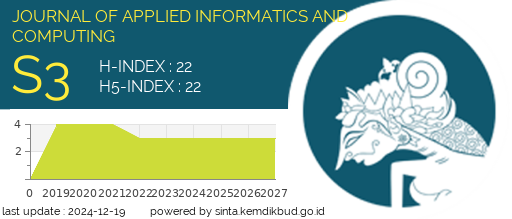DDoS Attacks Detection With Deep Learning Approach Using Convolutional Neural Network
DOI:
https://doi.org/10.30871/jaic.v8i2.8242Keywords:
Convolutional Neural Network, DDoS Attacks, Deep Learning, Electric VehicleAbstract
The detection system of DDoS (Distributed Denial-of-Service) attacks aims to enhance network security across all facets of internet technology utilization. One is at SPKLU, which stands for Public Electric Vehicle Charging Station. The research employed a deep learning approach utilizing a Convolutional Neural Network (CNN) on a publicly available dataset. Based on our study and analysis, CNN has a precision rate of 95%. Its high accuracy and balanced performance across diverse attack types indicate the model's practical application in real-life situations. The model demonstrates promising performance in detecting different network traffic anomalies, offering significant insight into its potential for practical use. Further investigation is necessary to strengthen the resilience of DDoS assault tactics against emerging dangers and to tackle any potential constraints.
Downloads
References
M. Shurman, R. Khrais, and A. Yateem, "DoS and DDoS Attack Detection Using Deep Learning and IDS," Int. Arab J. Inf. Technol., vol. 17, no. 4A, pp. 655"“661, Jul. 2020, doi: 10.34028/iajit/17/4A/10.
M. A. Al-Shareeda, S. Manickam, and M. A. Saare, "DDoS attacks detection using machine learning and deep learning techniques: analysis and comparison," Bull. Electr. Eng. Inform., vol. 12, no. 2, pp. 930"“939, Apr. 2023, doi: 10.11591/eei.v12i2.4466.
G. Lee, T. Lee, Z. Low, S. H. Low, and C. Ortega, "Adaptive Charging Network For Electric Vehicles," 2016.
P. Khuphiran, P. Leelaprute, P. Uthayopas, K. Ichikawa, and W. Watanakeesuntorn, "Performance Comparison of Machine Learning Models for DDoS Attacks Detection," in 2018 22nd International Computer Science and Engineering Conference (ICSEC), Chiang Mai, Thailand: IEEE, Nov. 2018, pp. 1"“4. doi: 10.1109/ICSEC.2018.8712757.
K. Kumari and M. Mrunalini, "Detecting Denial of Service attacks using machine learning algorithms," J. Big Data, vol. 9, no. 1, p. 56, Dec. 2022, doi: 10.1186/s40537-022-00616-0.
R. J. Alzahrani and A. Alzahrani, "Security Analysis of DDoS Attacks Using Machine Learning Algorithms in Networks Traffic," Electronics, vol. 10, no. 23, p. 2919, Nov. 2021, doi: 10.3390/electronics10232919.
A. R. Wani, Q. P. Rana, U. Saxena, and N. Pandey, "Analysis and Detection of DDoS Attacks on Cloud Computing Environment using Machine Learning Techniques," in 2019 Amity International Conference on Artificial Intelligence (AICAI), Dubai, United Arab Emirates: IEEE, Feb. 2019, pp. 870"“875. doi: 10.1109/AICAI.2019.8701238.
H. Tekleselassie, "A Deep Learning Approach for DDoS Attack Detection Using Supervised Learning," MATEC Web Conf., vol. 348, p. 01012, 2021, doi: 10.1051/matecconf/202134801012.
A. E. Cil, K. Yildiz, and A. Buldu, "Detection of DDoS attacks with feed forward based deep neural network model," Expert Syst. Appl., vol. 169, p. 114520, May 2021, doi: 10.1016/j.eswa.2020.114520.
M. K. Delimayanti, A. Mardiyono, B. Warsuta, and E. S. Puspitaningrum, "Implementation of Convolutional Neural Network for COVID19 Screening using X-Rays Images." Accessed: Sep. 14, 2023. [Online]. Available: https://ieeexplore.ieee.org/abstract/document/10127845
Koneru Lakshmaiah Education Foundation et al., "The Prediction of Diseases using Rough Set Theory with Recurrent Neural Network in Big Data Analytics," Int. J. Intell. Eng. Syst., vol. 13, no. 5, pp. 10"“18, Oct. 2020, doi: 10.22266/ijies2020.1031.02.
R. F. Naryanto, M. K. Delimayanti, A. Naryaningsih, B. Warsuta, R. Adi, and B. A. Setiawan, "Diesel Engine Fault Detection using Deep Learning Based on LSTM," in 2023 7th International Conference on Electrical, Telecommunication and Computer Engineering (ELTICOM), Medan, Indonesia: IEEE, Dec. 2023, pp. 37"“42. doi: 10.1109/ELTICOM61905.2023.10443110.
Z. Zhai, "Auto-encoder generative adversarial networks," J. Intell. Fuzzy Syst., vol. 35, no. 3, pp. 3043"“3049, Oct. 2018, doi: 10.3233/JIFS-169659.
Y. Kim, S. Hakak, and A. Ghorbani, "DDoS Attack Dataset (CICEV2023) against EV Authentication in Charging Infrastructure," in 2023 20th Annual International Conference on Privacy, Security and Trust (PST), Aug. 2023, pp. 1"“9. doi: 10.1109/PST58708.2023.10320202.
F. Setiawan and C.-W. Lin, "A Deep Learning Framework for Automatic Sleep Apnea Classification Based on Empirical Mode Decomposition Derived from Single-Lead Electrocardiogram," Life, vol. 12, no. 10, p. 1509, Sep. 2022, doi: 10.3390/life12101509.
A. R. Shaaban, E. Abd-Elwanis, and M. Hussein, "DDoS attack detection and classification via Convolutional Neural Network (CNN)," in 2019 Ninth International Conference on Intelligent Computing and Information Systems (ICICIS), Cairo, Egypt: IEEE, Dec. 2019, pp. 233"“238. doi: 10.1109/ICICIS46948.2019.9014826.
Downloads
Published
How to Cite
Issue
Section
License
Copyright (c) 2024 Rafiq Amalul Widodo, Mera Kartika Delimayanti, Asri Wulandari

This work is licensed under a Creative Commons Attribution-ShareAlike 4.0 International License.
Authors who publish with this journal agree to the following terms:
- Authors retain copyright and grant the journal right of first publication with the work simultaneously licensed under a Creative Commons Attribution License (Attribution-ShareAlike 4.0 International (CC BY-SA 4.0) ) that allows others to share the work with an acknowledgement of the work's authorship and initial publication in this journal.
- Authors are able to enter into separate, additional contractual arrangements for the non-exclusive distribution of the journal's published version of the work (e.g., post it to an institutional repository or publish it in a book), with an acknowledgement of its initial publication in this journal.
- Authors are permitted and encouraged to post their work online (e.g., in institutional repositories or on their website) prior to and during the submission process, as it can lead to productive exchanges, as well as earlier and greater citation of published work (See The Effect of Open Access).











